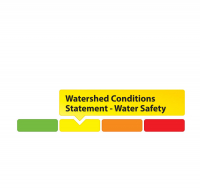(WCS – R03/2022)
March 8, 2022 – The winter of 2021/22 is quickly coming to an end, and RVCA’s Flood Forecasting team is working closely with its municipal and agency partners to prepare for potential spring flooding.
To date, the spring flood outlook remains positive. December was generally mild with below average precipitation, while temperatures in January were well below normal. Precipitation in January was also below normal but a large storm mid-January left almost 50 cm of snow on the ground. In February, both the temperature and precipitation amounts were very close to normal. Early March conditions at several RVCA and Parks Canada snow course sites indicated near normal amounts of snow for this time of year. However, some snow was lost due to mild temperatures on Sunday, March 6. Water levels and flows across the watershed are now near normal for early March.
The current short-term weather forecast indicates daytime high temperatures near zero and night-time low temperatures below zero for the next five days. The forecast also indicates some mixed precipitation during this same time-period.
If the temperatures come as forecast over the next few days, limited snowmelt is expected across the Rideau Valley watershed and is unlikely to cause any significant flooding. Parks Canada staff who manage the water levels for the Rideau Canal have indicated that the levels in lakes are expected to rise in the upper watershed lakes as the snowpack begins to melt.
Beyond the short-term forecast discussed above, it is difficult to predict what’s in store for flooding conditions in the Rideau Valley Watershed, since flood conditions are a result of natural processes that vary from year to year based on snowmelt, temperature increases and precipitation events. It is important to be prepared for possible flood conditions for the next few weeks as the winter comes to an end.
City of Ottawa crews have begun the annual ice removal program on the Rideau River between Rideau Falls and Bronson Avenue. Crews will work to keep the ice from reforming until the spring freshet occurs (for more information call City of Ottawa’s information line at 311).
With rising water levels expected over the coming weeks, ice cover on lakes, ditches, local streams, and rivers will be unstable. Extreme caution should be exercised by everyone when near local waterbodies. Parents should inform their children of the risks and provide appropriate supervision. Keep pets leashed near waterbodies, as well.
Residents in flood-prone or low-lying areas that are historically susceptible to flooding should take the necessary precautions to protect their property, such as:
- Ensuring sump pump is clear, in good working condition and has a backwater valve
- Ensuring easy access to a portable backup generator and pump
- Ensuring downspouts are clear and the outlet is at least 3 metres from the dwelling
- Securing items that might float away as flows increase
- Removing valuable items from basements or lower floors that could be subject to flooding
- Keeping emergency phone numbers handy
- Familiarizing yourself with your municipality’s Emergency Preparedness Plan.
This watershed conditions statement is in effect until March 15, 2022, at 5 p.m. and will be updated at that time unless the forecast or conditions change first.
-end-
More Information:
Contact: Brian Stratton, RVCA Manager Engineering Services
Rideau Valley Conservation Authority
613-692-6804, 1-800-267-3504 ext. 1141
Rideau Valley Conservation Authority is a partnership of municipalities within the Rideau Valley watershed created under the Conservation Authorities Act to deliver a range of programs in watershed management and natural resource conservation.
RVCA Watershed Conditions Statements:
- Water Safety – High flows, unstable banks, melting ice or other factors that could be dangerous for recreational users such as anglers, canoeists, hikers, children, pets, etc. Flooding is not expected.
- Flood Outlook – Early notice of the potential for flooding based on weather forecasts, calling for heavy rain, snow melt, high winds or other conditions that could lead to high runoff, cause ice jams and/or lakeshore flooding or erosion.
- Flood Watch – Flooding is possible in specific watercourses or municipalities. Municipalities, emergency services and individuals in flood prone areas should prepare.
- Flood Warning – Flooding is imminent or already occurring in specific watercourses or municipalities.
